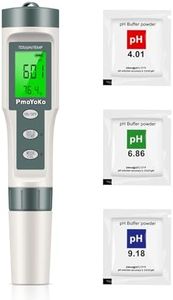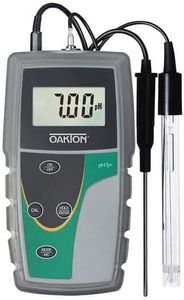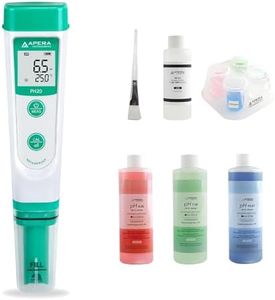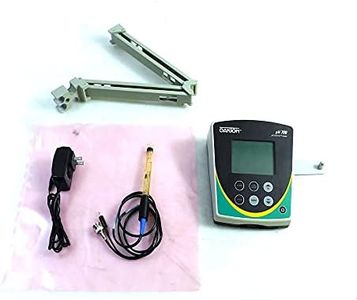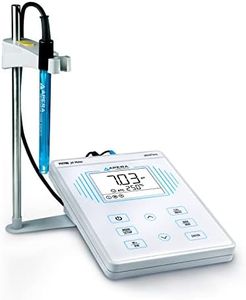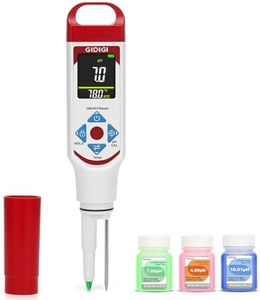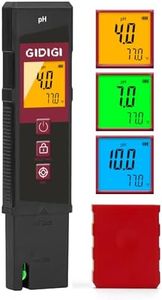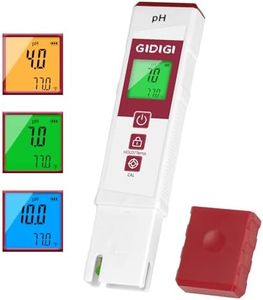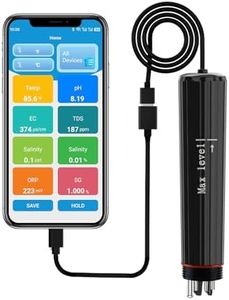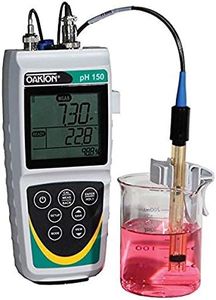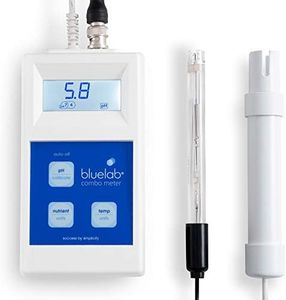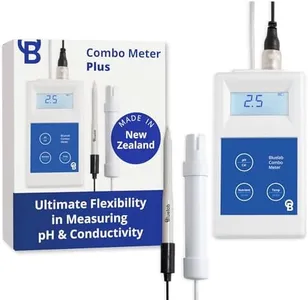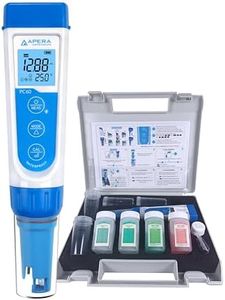10 Best Ph Meters 2026 in the United States
Our technology thoroughly searches through the online shopping world, reviewing hundreds of sites. We then process and analyze this information, updating in real-time to bring you the latest top-rated products. This way, you always get the best and most current options available.

Our Top Picks
Winner
Apera Instruments Premium-Series PH60S Food pH Pocket Tester Kit, Swiss Spear pH Electrode, ±0.01 pH Accuracy, -2.00-16.00 pH Range (AI313)
Most important from
3449 reviews
The Apera Instruments Premium-Series PH60S is a reliable pH meter designed especially for measuring pH in food items like cheese, sushi rice, meat, and dairy, as well as in general water solutions. It offers excellent accuracy with a precision of ±0.01 pH, which is great for users who need detailed and trustworthy readings. Its wide pH range from -2.00 to 16.00 means it can handle very acidic to very alkaline samples, covering nearly all common testing needs. The meter includes automatic calibration and temperature compensation, making it easier to get accurate results without fiddling with manual adjustments. A handy feature is its high/low value alarm that uses a red backlight to alert you instantly when readings fall outside your desired range, which helps prevent mistakes. The display is large and clear, with backlighting and dual readouts for both temperature and pH, aiding visibility in various lighting conditions.
Portability is another strong point: the kit comes with a sturdy carrying case that includes calibration solutions, batteries, a lanyard, and storage solution, all making it convenient for field use or on-the-go testing. The Swiss spear sensor is replaceable and designed for durability, suitable for solid and semi-solid foods. The sensor, while long-lasting, will eventually need replacing, which adds some maintenance costs. Also, those unfamiliar with pH testing might need some time to get comfortable with calibration steps. This pH meter represents a solid choice for food professionals, hobbyists, or anyone needing precise, portable pH measurements with helpful features that simplify testing.
Most important from
3449 reviews
Oakton AO-35613-22 pH 6+ Handheld Meter with pH Probe
Most important from
9 reviews
The Oakton AO-35613-22 pH 6+ Handheld Meter is a portable and battery-powered device designed for measuring pH levels. It offers a wide pH range from 0.00 to 14.00, making it versatile for various applications. Additionally, the meter can also measure mV and temperature, providing a comprehensive tool for accurate readings.
The digital display ensures clear and fast readings, which is convenient for quick assessments. The included ATC (Automatic Temperature Compensation) probe helps maintain accuracy by adjusting for temperature variations, enhancing reliability in different environments. Furthermore, the protective rubber boot and the durable outer material provide added protection, making it suitable for field use.
Its lightweight design (8 ounces) and compact dimensions (9.29 x 6.46 x 3.39 inches) enhance portability, allowing for easy transport and handling. Considering its features and design, this pH meter is ideal for professionals needing a reliable and portable tool for various industrial, scientific, or field applications.
Most important from
9 reviews
APERA INSTRUMENTS AI209-T Value Series PH20 pH Tester Combo Kit, including the Maintenance Set, and a CalPod Solution Holder for Easy Calibration
Most important from
9556 reviews
The Apera AI209-T pH Tester Combo Kit is a well-rounded option for anyone needing accurate and reliable pH measurements, whether for home, lab, or light industrial use. Its strength lies in the Apera quality pH sensor, which offers quick response times and stable readings thanks to low impedance technology. The device also includes automatic temperature compensation, so it maintains accuracy in a variety of working conditions between 32 and 122°F. Calibration is straightforward with the auto buffer recognition feature, and the included CalBox helps organize calibration solutions efficiently, saving money by reducing buffer waste.
The combo kit adds value by providing a probe cleaning brush to maintain the sensor’s lifespan and ensure durability over time. In terms of portability, it’s compact and lightweight, powered by four AAA batteries, making it easy to carry around. While the device is durable for everyday use, it may not be rugged enough for harsh industrial environments. This pH meter is a solid choice for users looking for ease of use, reliable accuracy, and good maintenance features in a portable form.
